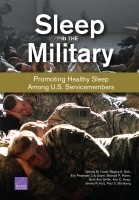| 来源类型 | Research Reports
|
| 规范类型 | 报告
|
| ISBN | 9780833088512
|
| 来源ID | RR-739-OSD
|
| Sleep in the Military: Promoting Healthy Sleep Among U.S. Servicemembers |
| Wendy M. Troxel; Regina A. Shih; Eric R. Pedersen; Lily Geyer; Michael P. Fisher; Beth Ann Griffin; Ann C. Haas; Jeremy Kurz; Paul S. Steinberg
|
| 发表日期 | 2015
|
| 出版年 | 2015
|
| 页码 | 280
|
| 语种 | 英语
|
| 结论 |
Sleep Problems Can Have Both Short- and Long-Term Negative Effects, but Evidence-Based Interventions Can Help - Sleep problems are common across the force, but their prevalence is particularly high among servicemembers who have deployed to conflict environments.
- A survey of personnel showed that insufficient sleep duration, poor sleep quality, fatigue and daytime impairment, were all common. Sleep problems can compromise operational effectiveness and make it difficult for servicemembers to resume their lives after returning home from a deployment.
- Sleep problems can lead to the development of serious mental health conditions, including post-traumatic stress disorder, depression, and traumatic brain injury. Treating sleep disturbances early on may be an important preventive strategy to reduce the risk of downstream mental health consequences.
- There is evidence that cognitive-behavioral therapy and imagery rehearsal therapy for insomnia may be effective in helping to alleviate sleep problems and address these correlated conditions, but dissemination of these strategies remains a challenge.
Policies and Programs Promoting Sleep Health Are Available to Servicemembers, but Barriers Challenge Their Implementation - Policies to guide treatment for sleep disorders and promote healthy sleep practices among servicemembers and veterans often lack specificity. For example, operational policies mandating sleep plans lack detailed guidance for implementing the plans.
- Even with evidence-based policies and programs to promote sleep health, it can be difficult for servicemembers to get the rest they need. Barriers to healthy sleep include possible stigma associated with taking breaks, widespread use of energy drinks and caffeine supplements, noisy and uncomfortable sleeping spaces, and a lack of a centralized repository for sleep-related policies and information to promote sleep health.
|
| 摘要 |
- Increase servicemember and line leader education about healthy sleep behaviors and knowledge about the factors that inhibit or promote adequate, restful sleep.
- Fund or conduct longitudinal studies on sleep and the effects on operational readiness and resilience.
- Continue to research evidence-based practices for promoting healthy sleep in military populations, and disseminate evidence-based treatments.
- Educate families on the signs and symptoms of sleep disturbances.
- Improve screening for sleep disturbances in primary care settings, and develop provider education programs and clinical practice guidelines with a focus on both preventing and treating sleep disorders.
- Increase the use of mobile technologies for assessing and clinically managing sleep disorders with the goal of identifying and monitoring sleep problems so they do not become chronic and debilitating.
- Improve continuity of care for sleep disorders across the deployment cycle.
- Make appropriate revisions to training and operational policies to minimize inconsistencies and align with current clinical guidelines about optimal sleep duration.
- Educate line leaders on creating sleep plans that align with current research and consider the physical sleep environment and shift schedules.
- Create standardized operational and training policies DoD-wide to improve sleep duration and quality and reduce impairment.
- Link data on safety mishaps to evaluate the role of sleep and fatigue.
- Prioritize sleep in reintegration policies to provide a recovery period for post-deployed servicemembers.
- Disseminate positive messaging about sleep as an operational imperative to increase awareness and reduce cultural barriers to healthy sleep.
|
| 主题 | Depression
; Military Force Deployment
; Military Health and Health Care
; Military Personnel
; Posttraumatic Stress Disorder
; Sleep
; Traumatic Brain Injury
|
| URL | https://www.rand.org/pubs/research_reports/RR739.html
|
| 来源智库 | RAND Corporation (United States)
|
| 资源类型 | 智库出版物
|
| 条目标识符 | http://119.78.100.153/handle/2XGU8XDN/107971
|
推荐引用方式
GB/T 7714 |
Wendy M. Troxel,Regina A. Shih,Eric R. Pedersen,et al. Sleep in the Military: Promoting Healthy Sleep Among U.S. Servicemembers. 2015.
|
|
文件名:
|
x1495316218000.jpg
|
|
格式:
|
JPEG
|

|
文件名:
|
RAND_RR739.pdf
|
|
格式:
|
Adobe PDF
|
除非特别说明,本系统中所有内容都受版权保护,并保留所有权利。